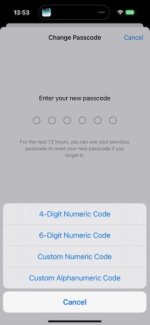Sorry Mark F, I missed the fact that you had already been suggested Apple's built-in password manager.
Honestly, I think a lot of people overthink the Security thing. As Jake has pointed out Apple devices already have a lot of built in security. If you take advantage of all of that eg. Hide My Email, Private Relay, Two Factor Authentication, Trusted Devices, Biometric recognition and Face ID, complex passwords and Stolen Device Protection you are not a "soft" target. It's my impression that there are still lots of "soft" targets out there.
My opinion is that chances are you will never be hacked and lets face it, if a hacker got access to say, a bank account login, there is still the difficulty of transferring any substantial amount of money to another account or spending much from a credit card if you have, like me, set daily limits and transaction notifications. These days most online theft is through phishing and deception although identity theft is often a part of that.
To deserve a complex plot to steal your identity for the purposes of property theft you need to be a worthwhile target. You're much more likely to be the victim of an investment scam where you voluntarily give you money away.
Personally I have been the victim of credit card fraud once where a couple of thousand dollars was gambled away over night at a location in another state. I caught it the next day, put a block on my card, the bank did not question the illegitimacy of the transactions, I received a new card within a week and my money was refunded.
So, I use Apple's Passwords app for pretty much all my online passwords and Enpass for government, banking and financial apps and sites because Apple's Passwords app does not have specific Categories or Templates for things like credit cards, passports, driving licenses, insurance documents ect, whereas Enpass Password Manager does. It's not a subscription based app, stores all my passwords/passkeys locally and syncs them to Enpass on my other devices via iCloud. Face ID or biometrics are required to open it on any device. I might also add that I use a full time VPN on all my devices so my IP address is hidden, my activity is not logged and all my data is encrypted both ways.
Of course nothing is completely foolproof, thats impossible but keeping yourself informed, staying safe online and utilising advances in security is a big part of it. Passkeys are of course a recent example of this, all my social media sites are now accessed with passkeys, this includes Google, Facebook, PayPal, WhatsApp MyGov and more.
To sum up I don't think using secure Notes is a good (safe) way to store your online passwords long term. It's not designed for that purpose and I have heard of users loosing all their Notes from time to time during System Upgrades and data transfers. It's not protected like the Passwords app where you receive notifications and ID verification is required for changes and edits.







